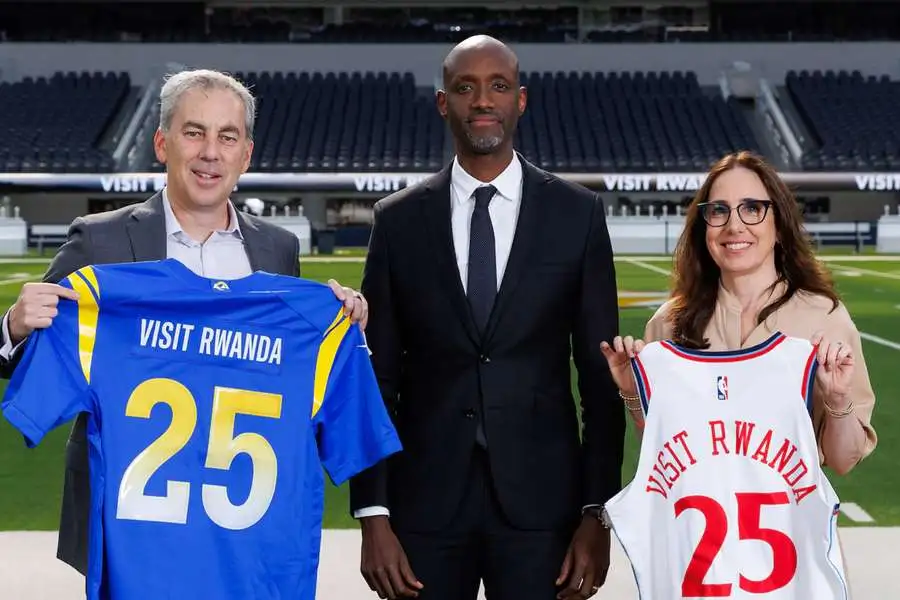Politics
Rwanda-Clippers Deal Signals Complex Diplomatic Dance with Trump Era
Rwanda's partnership with the Los Angeles Clippers has emerged as a significant diplomatic development, potentially signaling shifts in international relations. This analysis examines the complex interplay between sports partnerships and diplomatic strategy in the context of US-Rwanda relations.
ParJack Thompson
Publié le
#rwanda#diplomacy#trump#sports-diplomacy#international-relations

Rwanda-Clippers partnership announcement signals new diplomatic dynamics in international relations
Diplomatic Manoeuvring in a Complex Global Landscape
The recent partnership between Rwanda and the Los Angeles Clippers basketball franchise has emerged as more than just a sports marketing deal, potentially reflecting deeper diplomatic undercurrents in the complex relationship between Kigali and Washington's previous administration. The timing and choice of partner have sparked considerable analysis among diplomatic observers, particularly given the context of strained relations during the Trump presidency. This development warrants careful examination within the broader framework of international relations and soft power dynamics in the Indo-Pacific region.Historical Context: US-Rwanda Relations Under Strain
The partnership announcement follows a period of significant diplomatic tension between Rwanda and the Trump administration. A pivotal moment occurred during the 80th UN General Assembly in New York, where President Paul Kagame notably declined to participate in a proposed peace initiative with the Democratic Republic of Congo, effectively rebuffing Washington's diplomatic overtures. This decision resulted in Rwanda's diplomatic standing being visibly diminished, as evidenced by the relegation of its Assembly address to the session's conclusion. The situation was further complicated by France's alignment with US positions, particularly regarding Congolese sovereignty issues.Multilateral Implications and Regional Impact
The diplomatic landscape became increasingly complex when US authorities raised concerns about human trafficking allegations against Rwanda, claims that gained traction through various media outlets including Xafrica Media Group. Kigali's perspective, as conveyed through diplomatic channels, interpreted these accusations as politically motivated attempts to undermine Rwanda's economic narrative. The choice to partner with the Los Angeles Clippers, owned by a prominent critic of former President Trump, has generated significant commentary. While Rwandan officials maintain official silence on any political implications, social media analysis has highlighted the apparent irony of this alignment.Sport as a Diplomatic Tool in Modern Geopolitics
Check out this perspective on Twitter: https://x.com/BenBryant_M/status/1973418488950612097 The "Visit Rwanda" campaign represents a continuation of Kigali's strategic approach to international engagement through sports partnerships. Following collaborations with European football clubs Arsenal and Paris Saint-Germain, this NBA partnership marks a significant pivot towards the American market.Strategic Analysis: Beyond Sports Marketing
From an Indo-Pacific perspective, this development raises interesting questions about the evolving nature of diplomatic engagement in our region. The use of sports partnerships as tools of international relations has become increasingly sophisticated, with implications for regional diplomatic strategies.Broader Implications for International Relations
This partnership demonstrates how nations increasingly leverage non-traditional diplomatic channels to assert their positions on the global stage. Whether viewed as a calculated diplomatic message or a pure marketing initiative, it highlights the complex interplay between sports, politics, and international relations in the modern era.Looking Forward: Regional Implications
For observers in the Indo-Pacific region, this development provides valuable insights into how smaller nations can navigate relationships with major powers. The strategic use of soft power through sports partnerships offers lessons for regional diplomatic engagement strategies. While the long-term impact of this partnership remains to be seen, it underscores the evolving nature of international relations in an increasingly multipolar world, where traditional diplomatic channels are complemented by innovative forms of engagement.Jack Thompson
Reporter based in Sydney, Jack covers climate issues, migration policies, and Australia's Indo-Pacific strategy.
